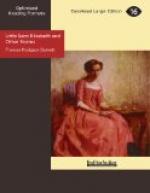“The water, honey,” said Jerry.
“What turns the water?”
“Well now, honey,” said Jerry, “you hev me thar. I don’t know nuffin ’bout it. Lors-a-massy, what a boy you is fur axin dif’cult questions.”
Then he carried the sack in to the miller, and said he would wait until the wheat was ground.
“Ground!” said the proud wheat. “We are going to be ground. I hope it is agreeable. Let us keep close together.”
They did keep close together, but it wasn’t very agreeable to be poured into a hopper and then crushed into fine powder between two big stones.
“Makes nice flour,” said the miller, rubbing it between his fingers.
“Flour!” said the wheat—which was wheat no longer. “Now I am flour, and I am finer than ever. How white I am! I really would rather be white than green or gold colour. I wonder where the learned grain is, and if it is as fine and white as I am?”
But the learned grain and her family had been laid away in the granary for seed wheat.
Before the waggon reached the house again, the two boys were fast asleep in the bottom of it, and had to be helped out just as the sack was, and carried in.
The sack was taken into the kitchen at once and opened, and even in its wheat days the flour had never been so proud as it was when it heard the farmer’s wife say—
“I’m going to make this into cake.”
“Ah!” it said; “I thought so. Now I shall be rich, and admired by everybody.”
The farmer’s wife then took some of it out in a large white bowl, and after that she busied herself beating eggs and sugar and butter all together in another bowl: and after a while she took the flour and beat it in also.
“Now I am in grand company,” said the flour. “The eggs and butter are the colour of gold, the sugar is like silver or diamonds. This is the very society for me.”
“The cake looks rich,” said one of the daughters.
“It’s rather too rich for them children,” said her mother. “But Lawsey, I dunno, neither. Nothin’ don’t hurt ’em. I reckon they could eat a panel of rail fence and come to no harm.”
“I’m rich,” said the flour to itself. “That is just what I intended from the first. I am rich and I am a cake.”
Just then, a pair of big brown eyes came and peeped into it. They belonged to a round little head with a mass of tangled curls all over it—they belonged to Vivian.
“What’s that?” he asked.
“Cake.”
“Who made it?”
“I did.”
“I like you,” said Vivian. “You’re such a nice woman. Who’s going to eat any of it? Is Lionel?”
“I’m afraid it’s too rich for boys,” said the woman, but she laughed and kissed him.
“No,” said Vivian. “I’m afraid it isn’t.”
“I shall be much too rich,” said the cake, angrily. “Boys, indeed. I was made for something better than boys.”




